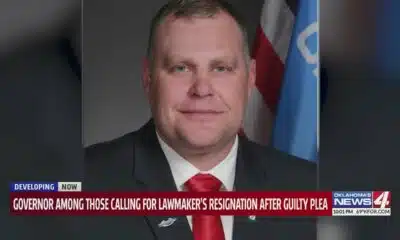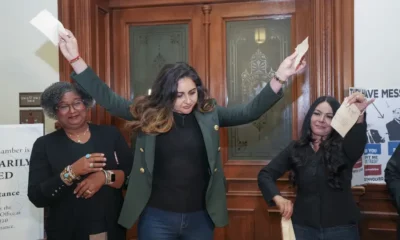News from the South - Kentucky News Feed
100 years after John Scopes was convicted of teaching evolution, education is again on trial
by Berry Craig, Kentucky Lantern
July 10, 2025
Today I’m remembering what Lela Scopes told me about her famous brother for my Paducah Sun story going on 46 years ago.
She said before John Thomas Scopes left to teach science and coach football at Rhea County High School in Dayton, Tenn., in 1924, he explained, “I’m going there because it’s a small town with a small school where I won’t get in any deep water.”
The skinny, bespectacled, freckle-faced 24-year-old from Paducah ended up the defendant in one of history’s most sensationalized courtroom battles.
A century ago this month, Scopes was convicted of violating the Butler Act, a Volunteer State law that forbade the teaching of evolution in public schools. His punishment was a $100 fine.
But the “Monkey Trial” grabbed newspaper headlines worldwide. Dozens of reporters converged on Dayton. So did tent revivalists and swarms of hucksters hawking popcorn and pink lemonade and hustling Bibles and souvenirs, including stuffed monkeys.
“The State of Tennessee v John Thomas Scopes” was also the first trial broadcast live on radio.
I interviewed Lela Scopes in August 1979, when I was a Sun feature writer. She also said John had worried about what their mother might think of the trial: “He was afraid it would get in the Louisville paper, Mother would read about it and think he was a hothead.”
Anyway, as Mark Twain said, “history doesn’t repeat itself, but it often rhymes,” and now is one of those rhyming times.
“Public education is once again under siege from a sustained effort by Christian Nationalists to blur the line between church and state,” warns A.J. Schumann, a youth organizing fellow with Americans United for Separation of Church and State.
Like today, the 1920s were times of “rapid social, economic and cultural change,” said David Krueger, professor emeritus of history at West Kentucky Community and Technical College in Paducah.
Scopes admitted he covered evolution when he substitute taught for the absent biology teacher. (In their zeal to ban evolution, Tennessee lawmakers failed to remove the state-approved biology textbook, which included evolution.)
Scopes believed in evolution and agreed to stand trial on principle.
The trial, which began on July 10, 1925, and concluded on July 21, was essentially a clash of competing values: urban science and modernism versus rural, old-time Protestant fundamentalist Christianity.
“The cause defended at Dayton is a continuing one that has existed throughout man’s brief history and will continue as long as man is here,” Scopes wrote in “Center of the Storm,” his 1967 memoir. “It is the cause of freedom, for which man must do what he can.”
The attorneys embodied the collision of values. Tennessee summoned William Jennings Bryan of Nebraska as special prosecutor. A fundamentalist champion, he had been a Democratic congressman, secretary of state and three-time Democratic presidential candidate.
The American Civil Liberties Union hired Clarence Darrow to lead Scopes’ defense team. Darrow was widely considered the country’s top defense lawyer. He was from Chicago, believed in evolution and was an agnostic.
Bryan and Darrow dueled like gladiators in the sweltering midsummer East Tennessee heat. The courtroom became so hot that the trial was moved outdoors to the tree-shaded courthouse lawn where the crowd of spectators grew even larger.
Bryan got a conviction as expected. But progressives, including liberal Christians, believed science and reason had vanquished “EVIL-lution” in the court of public opinion. They pointed to July 20 when Darrow called Bryan to the stand as a Bible expert.
“There was no pity for the helplessness of the believer come so suddenly and so unexpectedly upon a moment when he could not reconcile statements of the Bible with generally accepted facts,” The New York Times reported. “There was no pity for his admissions of ignorance of things boys and girls learn in high school, his floundering confessions that he knew practically nothing of geology, biology, philology, little of comparative religion, and little even of ancient history.”
… separation of church and state is not something we can take for granted. It is a principle that must be actively defended, especially in moments of cultural anxiety and political division, when calls to return to some mythic past grow loudest.”
– A.J. Schumann, Americans United for Separation of Church and State
In “Only Yesterday,” his 1931 chronicle of the 1920s, Frederick Lewis Allen wrote: “Theoretically, Fundamentalism had won, for the law stood. Yet really Fundamentalism had lost. Legislators might go on passing anti-evolution laws, and in the hinterlands the pious might still keep their religion locked in a science-proof compartment of their minds; but civilized opinion everywhere had regarded the Dayton trial with amazement and amusement, and the slow drift away from Fundamentalist certainty continued.”
Allen and the progressives of his day missed the mark. Donald Trump and his Republican Party owe a big part of their electoral success to white Christian evangelicals of the “God said it. I believe it. That settles it.” persuasion.
Schumann warned that “today’s Christian Nationalist rhetoric echoes the anti-modernist anxieties of the 1920s — fear that secularism is destroying ‘traditional values’ and that public institutions should reflect a ‘Christian America.’”
He wrote that the First Amendment safeguards all Americans “from having any single belief system imposed on them by the state,” a fact that seems to be lost on much of the GOP these days.
Schumann concluded that the Scopes “trial reminds us that the separation of church and state is not something we can take for granted. It is a principle that must be actively defended, especially in moments of cultural anxiety and political division, when calls to return to some mythic past grow loudest.”
Scopes died in 1970 at age 70. He is buried in the family plot in Paducah’s Oak Grove Cemetery next to his wife, Mildred, and close to Lela, who died in 1989 at 92. “A Man of Courage” is his epitaph. A state historical marker at the cemetery’s main entrance tells about him.
Scopes said not a word during the trial. He got his chance at the end.
After the jury delivered the expected guilty verdict and the judge fined Scopes $100, one of his lawyers pointed out that the defendant had been denied the right to speak before sentencing.
“Your Honor, I feel that I have been convicted of violating an unjust statute,” Scopes said. “I will continue in the future, as I have in the past, to oppose this law in any way I can. Any other action would be in violation of my ideals of academic freedom, that is to teach the truth as guaranteed in our Constitution, of personal and religious freedom. I think the fine is unjust.”
After Scopes finished, the judge repeated the fine. The verdict was later overturned on a technicality, Schumann wrote, but the Butler Act wasn’t repealed until 1967.
GET THE MORNING HEADLINES.
Kentucky Lantern is part of States Newsroom, a nonprofit news network supported by grants and a coalition of donors as a 501c(3) public charity. Kentucky Lantern maintains editorial independence. Contact Editor Jamie Lucke for questions: info@kentuckylantern.com.
The post 100 years after John Scopes was convicted of teaching evolution, education is again on trial appeared first on kentuckylantern.com
Note: The following A.I. based commentary is not part of the original article, reproduced above, but is offered in the hopes that it will promote greater media literacy and critical thinking, by making any potential bias more visible to the reader –Staff Editor.
Political Bias Rating: Center-Left
The content presents a viewpoint that emphasizes the importance of separating church and state and supports scientific education, framing the Scopes Trial as a historic battle between modernism and religious fundamentalism. It highlights concerns about contemporary Christian Nationalist influence on public education, particularly critiquing elements within the GOP, which indicates a critical stance toward conservative religious politics. However, it maintains a respectful historical recount and balanced tone by providing factual background and quoting multiple perspectives, reflecting a generally moderate but slightly progressive viewpoint favoring secularism and academic freedom.
News from the South - Kentucky News Feed
Service One names Justin Morris as new CEO
SUMMARY: Service One Credit Union appointed Justin Morris as CEO and President. Morris, who started as a part-time teller in 2005 while attending Western Kentucky University, has two decades of experience in operations, accounting, and risk management. He is committed to Service One’s mission of “Service to Others” and plans to focus on sustainable growth, digital enhancements, and expanding access to affordable financial services. His appointment follows longtime CEO Rebecca Stone’s retirement in January 2026; she will advise during the transition. Service One, a member-owned, not-for-profit cooperative founded in 1963, serves over 17,000 members across six Kentucky branches.
The post Service One names Justin Morris as new CEO appeared first on www.wnky.com
News from the South - Kentucky News Feed
Lexington Man Convicted of Firearms Offenses
SUMMARY: Keith Lamont Stallworth, 41, of Lexington, Kentucky, was convicted by a federal jury on August 27 for multiple firearms offenses related to drug trafficking. Arrested in August 2023, Stallworth possessed a .57 caliber pistol with high-velocity rounds and an extended magazine, along with methamphetamine, fentanyl, cocaine, ammunition, a 9mm handgun, and an illegally modified .40 caliber pistol converted into a machine gun. He previously pleaded guilty to drug distribution charges. The investigation involved DEA, ATF, Kentucky State Police, and local law enforcement. Stallworth faces up to life imprisonment, with sentencing scheduled for December 1.
Read the full article
The post Lexington Man Convicted of Firearms Offenses appeared first on lexingtonky.news
News from the South - Kentucky News Feed
CDC vaccine officials resign while childhood vaccination rates decline
by Nada Hassanein, Kentucky Lantern
August 29, 2025
Dr. Rana Alissa hears it daily in the clinic.
“It’s better for my kid to get the virus than get the vaccine.”
“The more you [doctors] vaccinate, the more money you get.”
“I did not vaccinate any of my kids, and I’m not going to vaccinate this one. So, please, don’t waste your time.”
The Jacksonville, Florida, pediatrician said on average, she’d hear vaccine skepticism from a couple of parents a month, at most, before the COVID-19 pandemic. “Now, it’s every day,” said Alissa, who is also president of the Florida Chapter of the American Academy of Pediatrics.
Medical experts say hesitancy is likely to increase further as a result of misinformation pouring from the Trump administration — and turmoil at the federal agency largely responsible for setting vaccine policy.
On Thursday, three top officials were escorted out of the Atlanta headquarters of the federal Centers for Disease Control and Prevention.
All three officials resigned to protest the effort by Secretary of Health and Human Services Robert F. Kennedy Jr. to dismiss CDC Director Susan Monarez for pushing back against Kennedy’s vaccine policies.
One of the officials, Dr. Demetre Daskalakis, director of the CDC’s National Center for Immunization and Respiratory Diseases, posted on X that he’s resigning because “the intentional eroding of trust in low-risk vaccines” will cause the nation to suffer.
Later on Thursday, the Trump administration named one of Kennedy’s top deputies, Jim O’Neill, to serve as the CDC’s acting director.
Earlier this week, the U.S. Food and Drug Administration restricted access to updated COVID-19 shots. The new rules include limitations for young children that the American Academy of Pediatrics called “deeply troubling.” The FDA only approved COVID-19 vaccines for people who are 65 and older and those who are known to be at risk for a severe case. Consultation with a medical provider will be required before the shot is given to healthy children under 18, meaning parents can’t simply take their kids to a vaccination clinic or pharmacy.
In June, Kennedy ousted all 17 members of the vaccine advisory committee at the CDC, replacing them with some members who are vaccine skeptics. Many states use the committee’s recommendations to develop their vaccine requirements. And in May, Kennedy rescinded recommendations for kids to get vaccinated against COVID-19.
In his books, experts say, Kennedy appears to promote his own version of miasma theory, an obsolete belief dating back to ancient times that diseases are caused by vapors from rotting organic matter. Scientists have since proven that microbes, not bad air, cause infectious diseases.
Experts say Kennedy’s actions are likely to make vaccination rates worse, paving the way for more outbreaks.
“Every vaccine that we give prevents a serious and life-threatening disease,” New York pediatrician Dr. Jesse Hackell, chair of the Committee on Pediatric Workforce at the American Academy of Pediatrics, told Stateline. “I don’t want to force anybody, but I do want to make sure that the information they’re getting is quality information — and that’s not what is coming from HHS.”
Nonmedical exemptions
Every state requires kids to get certain shots to attend school. All states exempt children who can’t be immunized for medical reasons, but nonmedical exemptions for religious or personal reasons vary from state to state.
Vaccination rates among kids are declining. Flu vaccinations, for example, hit their lowest rate since 2019. And since the beginning of the pandemic, exemption requests have increased across the country.
Among kindergarteners, nonmedical exemptions have increased each year since 2020, from 1.9% in the first year of the pandemic to 3.4% in the 2024-25 school year, according to the latest data from the federal Centers for Disease Control and Prevention. Exemptions increased in 36 states and Washington, D.C. Seventeen states reported exemption rates over 5%.
The changes may seem small. But experts say even slight increases in exemptions and decreases in vaccinations make a big difference.
“With a disease that’s as infectious as measles … small increases in vaccination rates could really go a long way,” epidemiologist Sophia Newcomer, a University of Montana associate professor, said in a recent panel discussion hosted by Montana Families for Vaccines.
Alissa and other experts say rampant confusion around the shots, including federal officials casting doubt, is exacerbating the problem. Often, parents aren’t sure whom they can trust, finding conflicting information and unreliable sources, she said.
“[Parents] come to our clinic and the hospitals and they say, ‘We looked it up, and we just don’t want it,’” she said. “There’s different kinds of reasoning: the ingredients of the vaccine, the side effects of the vaccine, ‘vaccines don’t work.’”
But research consistently shows vaccines protect children from serious illness. Shots also protect the most vulnerable who can’t get vaccinated, such as babies who are too young, or children and adults who are immunocompromised. Babies up to age 2 are more likely to get very sick from COVID-19, making up the most hospitalizations among kids.
Ultimately, Alissa said, “We are endangering each other.”
In Florida, where Alissa practices, religious exemptions have increased monthly, according to a state report that tracked the numbers through April. Some counties have higher rates of children with religious exemptions than others, ranging from about 1.5% to 15%, the state department of health reported. Among kindergarteners in the state, the rate of nonmedical exemptions rose from 2.7% in the 2020-21 school year to 4.8% in the 2024-25 school year, CDC data shows.
Five states — California, Connecticut, Maine, New York and West Virginia — don’t allow nonmedical exemptions, according to the National Conference of State Legislatures. Two West Virginia families with immunocompromised kids brought lawsuits over Republican Gov. Patrick Morrisey’s January executive order mandating religious exemptions despite state law.
Kennedy defended religious exemptions and endorsed the governor’s order in a post on X. His agency also sent letters to West Virginia health departments warning of civil rights violations if they don’t allow such exemptions.
“There’s a ton of variability across states in how easy it is to not get vaccinated,” Newcomer, of the University of Montana, said. Some states require parental vaccine education as part of the exemption request while others don’t.
“Increased exemptions needs to be fought at every level — working to make sure there’s access, to make sure that there’s good information, and to make sure that there’s strong policy at the state level, so that people aren’t exploiting exemption loopholes,” Northe Saunders, American Families for Vaccines president, said during the panel discussion.
Other vaccines
Doctors are worried that other vaccines will be targeted by the Trump administration, such as those for whooping cough. By April, preliminary CDC data showed more than 9,000 cases this year, about twice as many compared with the same time last year and more than there were right before the pandemic. Whooping cough, or pertussis, can be deadly for babies. Vaccines help prevent severe whooping cough illness.
Hackell said that when he was training in the 1970s, there were no pneumococcal and haemophilus vaccines. Babies would come in with 104-degree fevers and they were immediately tested for the infections, he recalled. For babies under age 2, those bacterial infections can show up as only a high fever, but the infection can rapidly turn fatal without treatment, he told Stateline.
“When I trained, we didn’t have these vaccines, and these kids kept us up at night,” Hackell said. “I never want to practice in those days. I never want to go back to that. … To me, that is unacceptable to submit my patients to those risks that we’ve been able to reduce.”
This week the FDA removed one of the available COVID-19 vaccines for young children, limiting the Spikevax vaccine to only kids with at least one serious health issue. Moderna’s shot is still available for children 6 months and older. Pfizer’s shot is no longer available for kids under 5, as the FDA is ending its emergency use authorization for the age group.
But the American Academy of Pediatrics recommends COVID-19 shots for children 6 months to 2 years. It also recommends them for older children with underlying health issues. Healthy children whose parents want them to get the shot should also be offered them, the AAP says.
Hackell is concerned by the FDA’s new limitations on the shot.
“As a parent, as a grandparent and as a physician who takes care of vulnerable kids, it disgusts me,” Hackell said.
He’s also concerned about vulnerable kids who get their shots through the federal Vaccines for Children (VFC) Program, which covers shots if parents can’t afford them and follows federal vaccine advisory recommendations.
“If you’re covered by VFC, which is basically kids on Medicaid and a few other populations, then you’re out of luck,” Hackell said. “To me, that’s a huge inequity in access to care, which is indefensible.”
He added that the move breaks with the administration’s emphasis on individual decision-making, saying the new restrictions limit parental decisions.
‘Normalization’ of outbreaks
During the Montana panel discussion, Dr. Paul Offit, director of the Vaccine Education Center at Children’s Hospital of Philadelphia, pointed to CDC data showing that over the past year alone, about 1 in 5 children and adolescents hospitalized with COVID-19 were put in the ICU. And between September 2023 and last August, 152 children died of COVID-19 and 213 children died of the flu.
While Texas officially declared its measles outbreak over — which means the state hasn’t reported a new case in six weeks — neighboring New Mexico continues to see new cases.
“What we’re going to see is, you know, sadly, a normalization of these outbreaks,” said Rekha Lakshmanan, chief strategy officer at The Immunization Partnership, a Texas-based vaccine education organization. “We need to make sure that kids are protected against the diseases that they can be protected against, because we truly are in a vulnerable state right now.”
Newcomer, the Montana epidemiologist, said that under-vaccination trends are usually due to disparities in access, such as challenges in reaching vaccine providers in rural communities. At rural health care centers lacking staff and technology, it’s harder to automate vaccination reminders for patients — which can increase the likelihood patients show up for appointments but require technical infrastructure, she explained.
Adding misinformation to the mix only makes matters worse, experts say.
“Parents are confused and understandably concerned,” Offit told Stateline. “It’s the most vulnerable among us that will suffer, and that will be our children.”
He added that he’s also wary about the federal administration’s removal of data, concerned that vaccination figures will be next.
“It’s nightmarish,” he said. “What worries me the most is we’re not going to know the degree that we’re suffering. We’re not, because the CDC is losing its capacity to do adequate surveillance across the country.”
This story has been republished from Stateline, a sister publication to the Kentucky Lantern and part of the nonprofit States Newsroom network.
Kentucky Lantern is part of States Newsroom, a nonprofit news network supported by grants and a coalition of donors as a 501c(3) public charity. Kentucky Lantern maintains editorial independence. Contact Editor Jamie Lucke for questions: info@kentuckylantern.com.
The post CDC vaccine officials resign while childhood vaccination rates decline appeared first on kentuckylantern.com
Note: The following A.I. based commentary is not part of the original article, reproduced above, but is offered in the hopes that it will promote greater media literacy and critical thinking, by making any potential bias more visible to the reader –Staff Editor.
Political Bias Rating: Center-Left
The content presents a critical view of the Trump administration’s handling of vaccine policies, highlighting concerns from medical experts and public health officials about rising vaccine hesitancy, misinformation, and administrative changes perceived to undermine federal health agencies like the CDC and FDA. It emphasizes the scientific consensus on vaccine efficacy and safety, and draws attention to the public health risks associated with decreased vaccination. While it critiques conservative figures and policies, it largely focuses on promoting evidence-based health information and public welfare, which aligns with a center-left perspective that supports governmental intervention for health protections and counters misinformation. The article does not exhibit extreme partisanship but leans toward a critique of right-wing approaches to vaccine policy.
-
News from the South - Texas News Feed5 days ago
Racism Wrapped in Rural Warmth
-
News from the South - Texas News Feed7 days ago
DEA agents uncover 'torture chamber,' buried drugs and bones at Kentucky home
-
News from the South - Missouri News Feed6 days ago
Donors to private school voucher program removed from Missouri transparency site
-
News from the South - Florida News Feed7 days ago
Ukraine’s independence-era voices say Russia’s effort to keep control has lasted decades
-
News from the South - Texas News Feed6 days ago
Texas Democrats’ walkout prompts GOP retribution
-
News from the South - Alabama News Feed5 days ago
Child in north Alabama has measles, says Alabama Department of Public Health
-
News from the South - Tennessee News Feed2 days ago
New developments in Pauline Pusser case
-
Our Mississippi Home5 days ago
After the Winds: Kindness in Katrina’s Wake










































